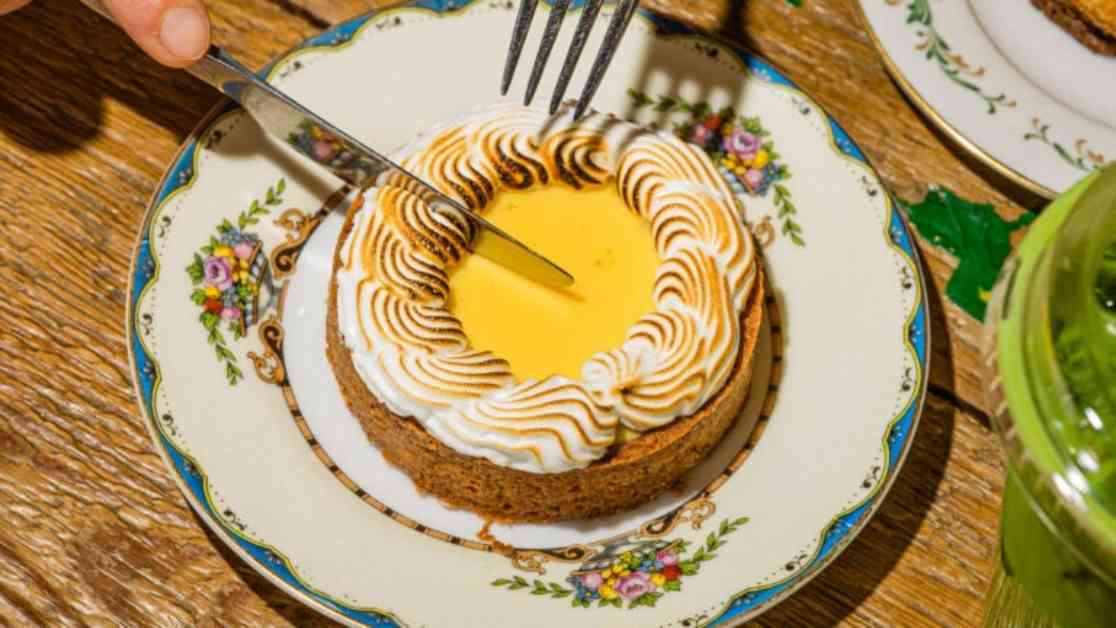Some bakeries have noticed more customers needing some comfort, like at Verveine Cafe & Bakery. Boston.com/Chris McIntosh
Top Shelf Cookies owner Heather Yunger understands the trend since last November: Customers come in for one, maybe two, cookies at their Dorchester brick-and-mortar, sometimes in the morning before work, for an afternoon pick-me-up, or before they go home. “I’m seeing more people come in and be like, ‘Ugh, I’m having a day,’” Yunger said. Heather Yunger at Top Shelf Cookies. Boston.com/Chris McIntosh. It’s low pressure to buy one cookie instead of a box of a dozen, Yunger said. And she’s witnessed a bite, or even a smell, of their Top Shelf cookies can improve a customer’s mood who’s clearly going through something stressful. Call it the little treat, which isn’t new, but in Boston’s booming bakery and pastry scene, the options are growing for a population of Bostonians who are stressed about work, the economy, and unprecedented current events. Jimmy Liang, founder of JP Fuji Group, which runs Asian-French fusion bakery Niveaux Patisserie, said he thinks COVID-19 rewired people’s priorities. Mostly driven by their beautifully decorated pastries going viral on TikTok, they too have seen customers coming in for instant gratification via one Instagrammable croissant. “I feel like a lot of people’s mentalities have changed: live for today, not for tomorrow,” Liang said. The origin of little treat culture as a recent trend came about some time during the pandemic — a global stressor, to be sure, marked by an increase in discretionary spending once lockdown rules relaxed. The New York Times reports that 14 years ago, “little treat” was “treat yo’self,” which came from a 2011 episode of NBC’s Parks & Recreation. And in the early 2000s, a term known as the “lipstick index” was created to define consumer spending habits during economic downturns. When consumers turn away from high-ticket items, like new televisions or cars, but are still willing to purchase affordable luxuries, those spending habits can be viewed as a recession indicator. Lyndell’s in Somerville, which has been a bakery for more than 130 years, has weathered its fair share of economic downturns. And yet people always make their way to grab a few half moon cookies, said owner Bill Galatis. “A bakery like ours, we almost become recession resistant,” Galatis said. “People … return to us because of the uncertainty of the economy.” Half moon cookies from Lyndell’s in Somerville. Boston.com/Chris McIntosh When Deloitte, a consulting firm, asked respondents around the world about their splurging habits, 77% admitted to buying something recently that served as a personal treat, even though 42% said they can actually afford to spend money on things they enjoy. The biggest splurge category was overwhelmingly food and drink. “People may not have $50 or $100 extra,” said Taya Stenson, Levain Bakery’s COO. “At most bakeries, you can go in and get something for less than $10.” While the reasons why a customer may be lured into a daily cookie habit aren’t optimistic, the result has meant growth for bakeries in an uncertain period for the restaurant industry. Greater Boston already had some bakery greats to count on for decades, like Lyndell’s, Bova’s Bakery in the North End, and Lolly’s Bakery in East Boston. But post-COVID, Boston has seen a slew of new bakeries pop up or expand. Take Levain, for example, a New York-based chain, who brought its viral cookies to Boston to two storefronts — one in Back Bay in 2022, and the other in Seaport in 2024. Freshly baked pasteis de nata at Flake Bakery in Brookline. (Lisa Zwirn) Niveaux is also new, less than a year old, from the group behind the Fuji sushi restaurants. There’s Flake Bakery, too, which has seen high demand at its Brookline shop even though it only makes one pastry — the pasteis de nata, a Portuguese tart. “Slowly you’re starting to see things diversifying a bit,” said Christina Quintino, who owns Flake Bakery. Quintino wasn’t even a trained pastry chef when she decided to leave her job in web development to open up a bakery. Having grown up in Portugal, she missed her favorite little treat and wanted to bring it to Boston. If the overwhelming news cycle and dipping retirement funds is the sickness, comfort is the temporary cure. When Boston.com asked its readers for their favorite little treat, the ol’ faithful chocolate chip cookie received the most responses. For Third Cliff Bakery co-owner Natalie Crowley, cookies aren’t always her little treat preference. She’d rather have a decadent pastry. But besides the croissants, cookies are even a top seller at their Jamaica Plain spot. “There’s something a little bit nostalgic about it,” Crowley said. “It’s like getting home and getting that after-school snack.” Meg (left) and Natalie Crowley (right). In addition to comfort, people in search of a stress-reduction muffin are also desperately seeking convenience. Bakeries are usually fast, counter-service concepts. Maybe they could be considered “fast-casual,” which for years have had an edge on sit-down restaurants. It’s quick for customers to grab and go, and counter-service spots require less labor. Bakeries that also have cafe offerings, like salads and sandwiches, can utilize popular delivery apps like DoorDash and Uber Eats fairly painlessly. “I slowly opened up online ordering when my team could handle it,” said Verveine Cafe & Bakery owner Monica Glass. “Now that’s a huge portion of the business.” There are, of course, negative and mostly financial consequences to participating in little treat culture. Little indulgences still cost money that adds up, depending on your little treat habit, and it’s important to consider where you’re spending your money. It also, possibly, isn’t the best habit to get a treat every time you do a basic task that you don’t like. “It is a momentary pleasure that creates a dependency on the ‘treat’ which may not be naturally related to the task at hand,” clinical psychologist Zainab Delawalla told HuffPost. But if you’re cutting out your favorite cookie or a specialty latte for good to save for something like a house, Yunger said she thinks it’s more reasonable to be indulgent in this scenario — especially in Massachusetts. “You’re on this earth for so long — get a cookie,” Yunger said.
Katelyn Umholtz covers food and restaurants for Boston.com. Katelyn is also the author of The Dish, a weekly food newsletter. Sign up for The Dish Stay up to date on the latest food and drink news from Boston.com.





